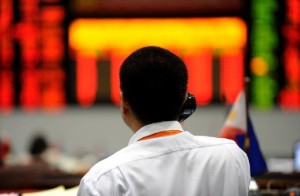
The Philippine Stock Exchange index rose by 106.44 points, or 2.26 percent, to 4,822.08. All counters rallied on broad-based buying but conglomerates, seen as a good proxy to the domestic economy, led the upswing with a gain of 3.7 percent.
The holding firms sub-index was boosted most by SM Investments Corp., the holding firm of tycoon Henry Sy, which gained by 8.23 percent to a new record high of P677 per share. There was a cross of about 13 million shares at P651 per share for a total of P8.4 billion, which a spokesperson from SMIC said was only part of the conglomerate’s “portfolio adjustment.”
Ayala Corp., which is now getting more aggressively into the infrastructure space, was likewise up by 6.9 percent to P387 per share.
“The gains of the market the past two days are broad-based, suggesting a sustained bullishness by investors. Now that companies have started announcing 2011 profits, investors continue to upgrade their expectations of above-average earnings growth in 2012 and ignoring rapidly rising valuation multiples,” said Jose Mari Lacson, head of research at Campos Lanuza & Co.
The PSEi’s new high also mirrored the region’s upbeat performance, said Manny Lisbona, deputy chief at PNB Securities.
“It seems that a decoupling of sorts is happening. That is, a weakness in developed markets would serve to drive rather than dampen appetite for emerging market assets,” he said.
Robert Vergara, president of the Government Service Insurance System, said the pension fund for government employees would await market pullbacks to increase its equity portfolio, which currently amounts to P67 billion, or 11.3 percent of its investible funds. He said the GSIS would like to increase the equity component of its portfolio to 13-14 percent, which would mean additional funds of P20 billion that could be plowed into the local stock market.
He said the GSIS, a key institutional investor in the country, would take advantage of market dips to load up on banks and conglomerates. While the market was not necessarily overpriced at this point, he said it’s not a good time to load up.
At present, about 30 percent of the GSIS’ equity fund is in utilities like power, telecommunications and water. Another 16.2 percent is in banks, 10 percent in conglomerates, 12.5 percent in property and 18 percent in consumer-tourism-gaming.
The GSIS has pared down its equity interests in some mining stocks, Vergara said.
Overall, he said, opportunities in the local equity market, Asia’s best-performing bourse in 2011, still looked better than other markets.
Other big contributors to the PSEi’s run-up on Thursday were: Metrobank (up by 2.7 percent to P81) , PLDT (up 2.6 percent to P2,798), BDO (up 1.74% to P61.45), ALI (up 6 percent to P18.98), Aboitiz Power, ICTSI (up 1.4 percent to P57.70) , AEV (up 2.8 percent to P43.40) and RLC (up 0.8 percent to P15.02).
Other notable gainers were Manila Mining A (only for local investors) and ORE, which respectively surged by 2.8 percent and 4.7 percent.
On the other hand, AGI, NiHao, SM Prime, First Gen, Megaworld and Philex traded lower on Thursday.
Turnover was heavy at P18.15 billion, including the SMIC cross-transaction.
There were 109 gainers against 57 decliners while 41 stocks were unchanged.